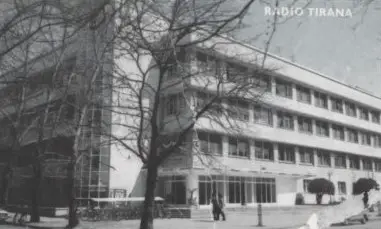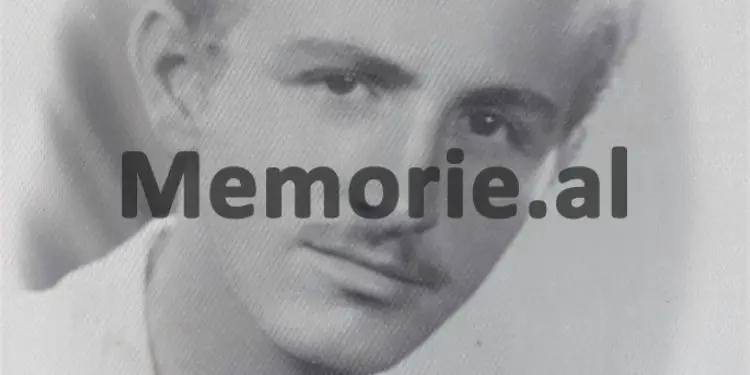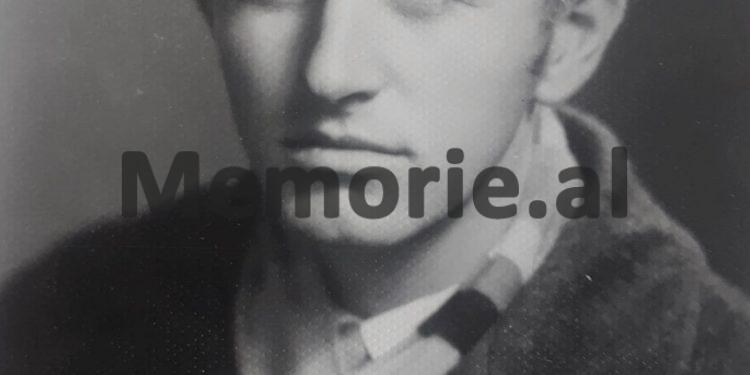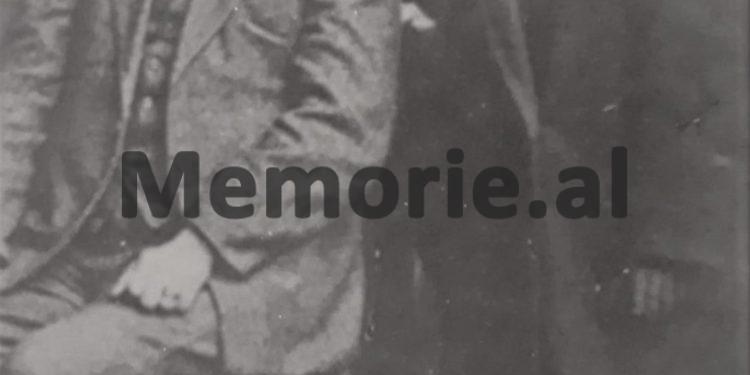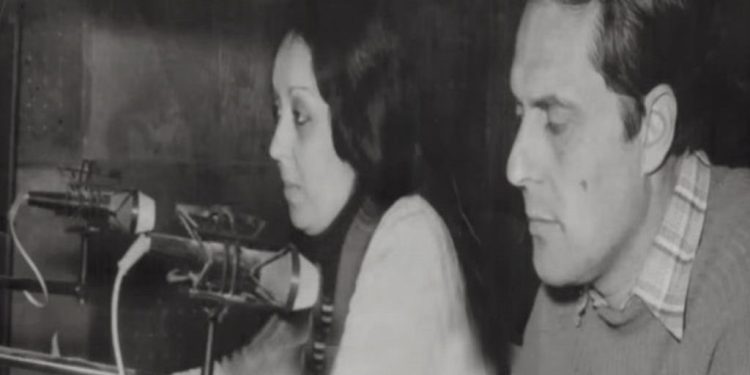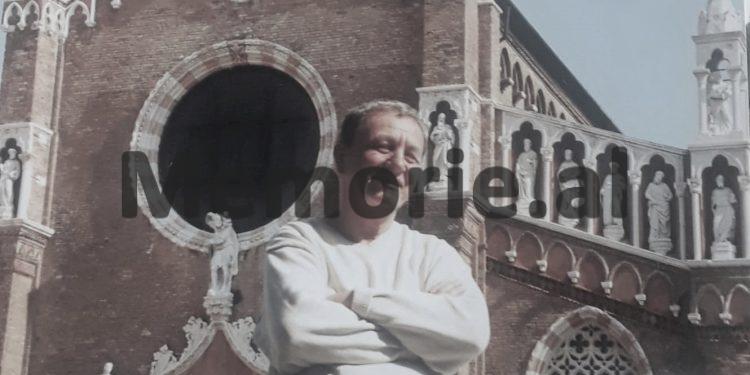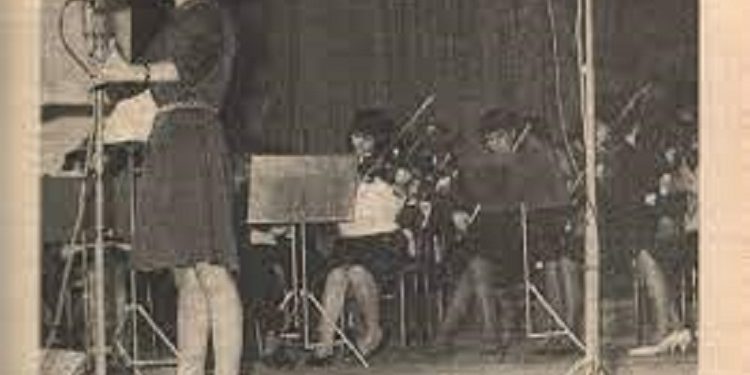By Bashkim Trenova
Part twenty-three
Memorie.al publishes the memoirs of the well-known journalist, publicist, translator, researcher, writer, playwright and diplomat, Bashkim Trenova, who after graduating from the Faculty of History and Philology of the State University of Tirana, in 1966 was appointed a journalist at Radio- Tirana in its Foreign Directorate, where he worked until 1975, when he was appointed journalist and head of the foreign editorial office of the newspaper ‘Zeri i Popullit’, a body of the Central Committee of the ALP. In the years 1984-1990, he served as chairman of the Publishing Branch in the General Directorate of State Archives and after the first free elections in Albania, in March 1991, he was appointed to the newspaper ‘Rilindja Demokratike’, initially as deputy / editor-in-chief and then its editor-in-chief, until 1994, when he was appointed to the Ministry of Foreign Affairs with the position of Press Director and spokesperson of that ministry. In 1997, Trenova was appointed Ambassador of Albania to the Kingdom of Belgium and to the Grand Duchy of Luxembourg. Unknown memories of Mr. Trenova, starting from the war period, his childhood, college years, professional career as a journalist and researcher at Radio Tirana, the newspaper ‘People’s Voice’ and the Central State Archive, where he served until the fall of the communist regime of Enver Hoxha, a period of time when he in different circumstances met many of his colleagues, suckers of some of the ‘reactionary families’, etc., whom he described with a rare skill in a book of memoirs published in 2012, entitled ‘Enemies of the people’ and now brings them to the readers of Memorie.al
Continued from the previous issue
“Enemies of the people”
Journalist colleague, Thimi Çollaku, for re-education in the working class of OAN!
After we finished with the labor control, in the Office I met one of my old colleagues, Thimi Çollaku. He was dressed in work clothes like all other workers. His hands were painted with car oil. I was amazed at his presence in the motorcycle ward. I asked, “Are you here?” With a guilty smile, Thimi replied, “I have come for re-education in the working class.” surprised!
In the Construction Vehicle Office, Thimi was brought with a very negative “passport”. I learned this from a conversation I had with the secretary of the Office Party, Sazan Qalliu, who was also in charge of the motorcycle department. All sorts of non-existent and unpleasant stories were told to Sazan about Thim by those who sent him to the Office. I told Sazan how I knew Thim.
To me Thimi Çollaku was an honest man, an incorrigible idealist. We had worked together with him on Radio Tirana, in different directorates, but both as journalists for international situations. Thimi had started working at Radio two or three years before me. He had made a name for himself as a well-liked journalist, as a good political commentator. Me and my newcomers to Radio, we were attracted by his way of handling political events, but also his nature, his character, always modest and open.
Thimi had graduated with honors in diplomacy in the Soviet Union. There, for his good and bad luck, he fell in love with Valian, his future Russian wife. I say “for his good fortune” because Valia was a wonderful Russian, a rare life partner. I add “for his bad luck”, because together they will share many deprivations in life.
After graduating, Thimin was appointed an employee of the Ministry of Foreign Affairs. At that time we were still in the years of the “great friendship” Albanian-Soviet. With the breakdown of relations between Albania and the Soviet Union, Thimi, married to a Russian woman, was seen as inappropriate at the Foreign Ministry. He was fired from there to begin work on the Committee on Cultural Relations with the Outside World, which was a branch of the Ministry of Foreign Affairs. Then they removed him from here, always as unsuitable, to bring him to Radio Tirana. Thim’s “slide” would not stop here either. I have the impression that he was not feeling well on the Radio.
Thim’s conflicts with Thanas Nano and the anonymous ‘lightning bolt’!
He did not have a good relationship with the general manager, Thanas Nano. He was once given a Lightning Rod in which he was criticized for his style and method of work. The lightning bolts of the time were also an imitation of what, during the Great Chinese Proletarian Cultural Revolution, were called “dacibao”. Lightning bolts or dacibaot, were like an article published in a wall newspaper, where everyone expressed their opinion about work, work relationships and management staff or colleagues, friends, colleagues. The thought had to be critical. This was the orientation of the Party, which also became a guarantee that the authors of the lightning bolts would have its protection from any possible revenge. I do not know why, after the publication of this lightning-free leaflet without an author, doubts began to fall on Thimi Çollaku. The contents of this lightning rod were never analyzed, nowhere. Meanwhile, if I am not mistaken, it seems to me that Thimi was even called the director of the Radio to make her accept her authorship. Thimi, of course, refused.
There has only been a brief period when Thimi has felt good on Radio. This happened after the arrival of Nefo Mufti as director of Internal Radio and Todi Lubonja as general director of Albanian Radio-Television. At that time he was also appointed as the editor-in-chief. It did not last long and all this, after the return of Thanas Nano as general director of the Albanian Radio Television, turned against him.
Being an employee of Radio Tirana, in addition to his daily work in the Information Office, Thimi was also involved in the publication of several books such as “100 questions about Albania”, a publication that, as far as I remember, served as a tourist guide and at the same time propaganda for foreigners, to present Albania as beautiful and attractive as possible in the outside world. He will also be the author of The Truth about Dollar Democracy, The Uncrowned Kings of America, Sick Society, and more.
The persecution of Thimi Çollaku after the publication of some of his books, but the cause was the Russian woman!
These publications, as can be understood from their titles, have an anti-capitalist and anti-imperialist edge. They are heavily criticized and, if we speak the language of the time, ruthlessly unmasked American capital and bourgeois democracy. This view was in full accordance with the official politics and ideology in Albania. However, it was these publications that would serve to formally justify the persecution and denigration of Thim for years.
These publications became a critical object on Radio Tirana. It was Liri Çeli, secretary of the Radio Tirana Party and head of the Music Editorial Office, who claimed these publications. I do not know if any concrete argument was used to reject Thimi Çollaku’s books as politically or ideologically wrong and harmful. The idea spread that through them, Thimi supported the theses of “peaceful coexistence”, which were known as theses spread by the Soviet revisionists, i.e. by the Soviet Communist Party and its chairman Nikita Khrushchev that is, by those known as enemies of Marxism-Leninism and Albania. I do not know if any phrase was quoted from them to prove this. Maybe the books had not even been read at all, but Thimi should have been punished for other reasons, which had nothing to do with his books. So he, for punishment, was brought to the Construction Vehicle Office.
I have never been able to understand how it could be sent, anyone, to a factory, a factory or a farm to make the life of a simple worker or peasant and this to be done as a result of a measure, of a punishment. Doesn’t this mean that Albanian workers and peasants were fatally convicted simply because they were? Does not this mean that almost the entire Albanian society was doomed, that what the Party itself presented as its social base, as its foundation, the working class and the cooperative peasantry, were doomed?
Does not this raise the question: Who were the unconvicted in communism? Why was communism so identified with punishment in general and undeserved punishment in particular? Not wanting to accept this lived truth, years later I thought that communism in Albania and in other countries where he came to power, was not the scientific communism of Marxists and Engels. In my opinion he was a feudal communism, a primitive communism, which could not be run by anyone but primitive leaders of tribal or regional clans, people with a primitive and aggressive mentality. These were defending their world, a world that had sunk and returned as a historic accident why reason and logic did not find a place; they were even in contradiction with what can be seen as class or communist logic or reason.
Thim’s wife, Russian Valia, from a Radio journalist at the “Gjergj Dimitrov” Farm!
Thimi was convicted because he had a Russian wife, because he refused to divorce her, to leave the children without a mother, to say “enough more” to her for whom he had abandoned everything. He refused to divorce Valian, who in turn refused to break up the family, abandon the children, Viktor and Mimoza, refused to return to where she came from, to Russia. People are not chess pieces, but communism loved them that way, otherwise you would inevitably face the consequences. In communism you had to choose between love for loved ones and blind allegiance to a system of revenge to the point of madness. Thimi “chose” the Construction Vehicle Office.
While for Thim some “mistakes” were found to punish him, for his wife, Valian, there was no need to find any mistakes, even if made up. She was sent as a farm worker to the Gjergj Dimitrov State Agricultural Enterprise. She could be sent, like many others, to work as a laborer in a factory or factory in the capital, at least to have a roof over her head, to be protected from the wind and rain. It was not decided that way. Valia did not deserve to be a simple worker either. To live, they gave her the hoe and the mud of the hills of Tirana, where the “Gjergj Dimitrov” farm was.
I had also known Valian on Radio Tirana. Initially she came speaking as the host of the Russian show. There was an extraordinary ringing voice. It was said on Radio Tirana that even Radio Moscow did not have such a speaker! Later, with the expansion of broadcasting hours in Russian, Valia started working at the Foreign Directorate of Radio Tirana as a speaker and translator. Unlike Ina Tarasova, who had an “aristocratic” appearance, unlike Tamara “Barbie”, Valia was typically Russian, just as we have clichés about Russian women. She was open, somewhat noisy, with a gurgling laugh and an anger that did not hide.
At work he was always correct. From the small studio microphone it seemed as if she was reciting on a stage, conveying her voice in the endless expanses of her homeland. Valia had not finished acting school, however, at the microphone she was a real actress. Maybe that was what her nostalgic and romantic Russian soul did! Surely she was punished for this spirit, for her own Russian being even though it was not her, who had chosen to be born or not.
Valia worked on the farm for about 15 years, as did Thimi as a motorist, turner or founder. She became a distinguished worker. I remember when I met her on one occasion; she told me how the women of the labor brigade had wanted to elect her as a delegate to the Albanian Women’s Congress. They had been told to choose the best and they had chosen Valian as the best. She had insisted that they not choose her, but they too had insisted on choosing her. As a conclusion in the Congress did not go Valia, but someone else. It was normal. A convict could not go to the Congress even though officially the same sentence was not imposed on Valian. She had to suffer an undeclared, dishonest sentence, like his own masters.
The fact that Valia was not allowed to go as a delegate to the Congress of the Albanian Women’s Union, which was officially one of the levers of the Labor Party, as well as the Professional Unions of Albania or the Albanian Labor Youth Union, “normally”, had to lead to her isolation from the brigade comrades. They should have seen more clearly now that Valia was unwanted by the regime, by the Party, that Valia was the black sheep of the herd. That did not really happen. I was told that when Valia and Thimi married their daughter, Mimoza, three friends who had worked with Thimi in the Information Office of Radio Tirana, went to congratulate them. The house of Valia and Thim was full of women of “Gjergj Dimitrov”, working friends of Valia’s brigade, who behaved like at home and rejoiced as if they were marrying their child. Valia gave people love and people surrounded him with love. She retired between them.
Thim’s departure from Tirana to Berat where he worked for 15 years in the foundry!
I did not work long in the Office with Thim. Little by little, the three-year period of my internship as a Labor Party candidate was coming to an end. After I left Office Thimi became a turner, taking my place next to the old Kyrgyz lathe, but not for long. I know where they were not satisfied that the Çollaku family, despite the endless difficulties, was still united. There was no reason for this family to be “privileged”, there was no reason for it not to follow the fate of all those families, which were created on the basis of the marriages of foreign women with Albanian men. The spirits of “justice” could not be appeased by the injustices they had done so far to Thim and Valias. Such were the times; “justice” was sought in the deepening of injustice!
Thimin was sent to Berat. He left there without saying a word, as always, calm, wise, a little philosopher and very idealistic. Berat is known as a city where, in one of its neighborhoods, the sworn enemies of the Labor Party penetrated. Thimi was not a communist, but neither was he an enemy of the Labor Party, much less a sworn one. However, apparently, they wanted to “crucify” him there as antichrist! They put him to work in the foundry of the Textile Factory named “Mao Ce Dun”…!
Fifteen years forced to leave the profession, then also from Tirana, deprivation of the right to publish, departure from family, friends, fifteen years in anxiety that every day may be the last day of freedom, fifteen years on the brink of insecurity, are very, very much for a human life. They are neither returned nor replaced. Even when they end, they accompany the following years as a tragic shadow, all their lives until its end.
In August 1975, after three years of internship in the Construction Vehicle Workshop, after leaving Thim the old Soviet lathe, I applied to the Party Party of the Region to be accepted as a member of the Labor Party. In a relatively large hall, behind some tables stood the First Secretary of this Party Committee, Gani Keçi and other secretaries and members of this committee. Among them I knew the Qinami Museum, a modest and correct tyrant, as are the local tyrants in general. I was accompanied by the Deputy Secretary of the Oficina Party, Ismail Hysa, and a blacksmith. We were somewhat related to him because he too was engaged in the Oficina amateur theater group. We had also been together in the labor control group at the Higher Institute of Arts.
As should be the formal rule of the case, Ismaili was asked if the organization of the Office Party was satisfied with my work in this Office and, in general, what was the opinion of this organization to me. Ismili expressed himself with superlatives. After some questions and answers, it was proposed that my candidacy be put to the vote. I was accepted as a member of the Labor Party. Gani Keçi congratulated me and at the same time added: “You will return to work in the Foreign Directorate of Radio Tirana, but look, be careful that if we accept you as a member of the Labor Party, we will expel you.” Ganiu was not one of those people who sought problems even when there were none. He even wanted to close them when they were present.
His words probably conveyed this message to me: – “Go do the work and leave the others because neither you nor I will fix this world”! I, however, did not feel the joy that acceptance as a member of the Labor Party should give me. I, I believe, was the first, perhaps the last communist in the world, to be accepted as a member of the Party and to be expelled from it! The words of Gani Keçi, the First Secretary of the Party Committee of the Region, deeply disappointed me. I did not find his position communist. It did not occur to me that this position really was not communist, but it could be parental, it sought to protect me from blind communist idealism as well as from communist rogue.
Ismaili and I then returned to the Office, met with Sazan Qalliu, the secretary of the Party organization, and told him how the procedure for my admission as a member of the Labor Party took place. He congratulated me, but he also understood my despair, so he invited me to have a glass of beer together from Kinostudio, about five hundred meters away from Oficina. “Hajt, do not worry,” Sazani told me,”! Sazani, either he also had a dose of idealism, or as a practical in life, just wanted to calm me down. The others, just like Gani Keçi, did not matter to him. I see the attitude of both today as benevolent.
After joining the Party, the vicissitudes of resuming work at Radio Tirana!
After parting ways with my friends in the Construction Vehicle Office, I went to resume work at the Foreign Directorate of Radio Tirana, as decided by the Party Committee of the Region. I first met the director, Kiço Pandelin. Instead of welcoming him, he told me that they would see the possibility of hiring me on Radio. I told him that this was the decision of the Party Committee of the Region. I wanted to let them know that he had nothing to see, that it was the Party that had decided. Apparently he, in his own way, knew that the Party was no longer only Gani Keçi, but also the Party Committee, it was not this Committee that did the staff policy on Radio, but Thanas Nano, he and others around tire. “We have no place in the staff,” he told me. We will talk to Comrade Thanas when he returns that he is not here now. You go and wait in one of the editorial offices of the Directorate “.
So I did, and at the same time I went to the Party Committee to be told how I was received as a communist on Foreign Radio. There I met Met Trasjen, a member of the Committee. “You will work in Radio,” Met Trasja told me, “this is the decision of the Committee.” I continued to go regularly every day to Radio Tirana. Every day I had to get a receipt from the police officer on duty, as any visitor or external collaborator of the Radio did./Memorie.al
The next issue follows




